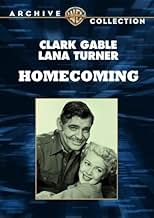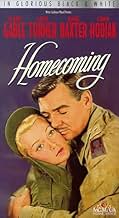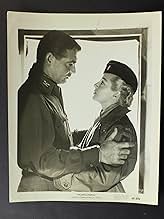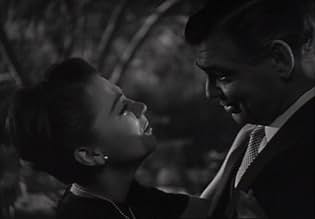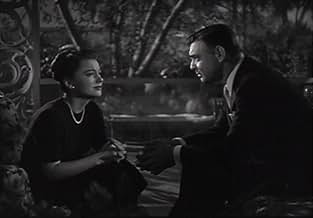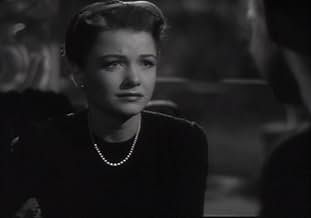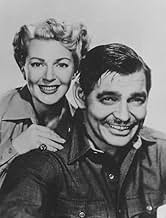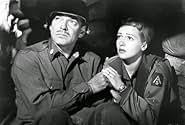IMDb रेटिंग
6.8/10
1.2 हज़ार
आपकी रेटिंग
अपनी भाषा में प्लॉट जोड़ेंAt the end of WW2, aboard a repatriation ship, an Army doctor reminisces about his war years while being interviewed by a reporter.At the end of WW2, aboard a repatriation ship, an Army doctor reminisces about his war years while being interviewed by a reporter.At the end of WW2, aboard a repatriation ship, an Army doctor reminisces about his war years while being interviewed by a reporter.
- पुरस्कार
- कुल 4 जीत
Jessica Grayson
- Sarah, Johnson's Maid
- (as Jessie Grayson)
John Albright
- Corpsman
- (बिना क्रेडिट के)
Frank Arnold
- Maitre d'Hotel
- (बिना क्रेडिट के)
Peggy Badley
- Nurse Betty Simpson
- (बिना क्रेडिट के)
Art Baker
- Williams, Reporter on Transport Ship
- (बिना क्रेडिट के)
Gregg Barton
- Captain
- (बिना क्रेडिट के)
Nanette Bordeaux
- Nurse
- (बिना क्रेडिट के)
फ़ीचर्ड समीक्षाएं
Movies like this one are discoveries. Mervyn LeRoy was a director that always knew where to go for a good story and get amazing performances out of his actors. In this film he demonstrates how to create a movie that holds the viewer's attention. It is based on a story by Sidney Kingsley and was adapted by Jan Lustig.
The movie shows the American cinema at its best as it combines a look to WWII and a forbidden love, something that probably had a hard time passing the censor's scissors. Mr. LeRoy makes the picture highly engrossing because of the way he presents the story. Men and women, for the first time were in the front lines; the men as combatants, or in this case, a doctor and the women as nurses, or filling in for the jobs the men couldn't do because they did the fighting.
Clark Gable was an actor that made this picture the joy it is to watch by making us believe he is this surgeon, Dr. Lee Johnson, a man that awakes to reality when he has to deal first hand with treating the wounded soldiers. Mr. Gable casts such a virile shadow in his best work that we know where he stood all the time. His Dr. Johnson shows the strain of the stress of war, the loyalty to his wife at home and the sudden love he finds for "Snapshot" McCall. He remains throughout the film focused in helping the soldiers, until the passion he feels for his nurse, gets the best of him.
Lana Turner is the real surprise of the movie. She is playing a role that probably would not have been offered to her because of the heat and glamour she projected. Her nurse McCall is a woman that life has made a cynic because of the tragedy in her own life and the fact that she is separated from her young son. The magnetism between Ms. Turner and Mr. Gable is what keeps us interested in the movie. Lana Turner shows she had the potential for playing dramatic parts that were not offered to her; she was type-casted as the siren, or the sophisticate in most of her work, but she had the range and the potential that probably only Mr. LeRoy, who discovered Ms. Turner, saw she had. Only a director like Mr. LeRoy could elicit this performance from Ms. Turner.
Anne Baxter is the wife that stays home hoping her man will come back alive. Her Penny Johnson makes her appear as insecure because she perceives her husband's affection might lie with the nurse that he complains to her at the beginning of his correspondence. John Hodiak plays the friend, Dr. Sunday, a man who has his feet on the ground and believes he should help the poor people of his area, instead of the society types that Dr. Johnson attracts.
The movie is satisfying because is tells a good story with characters one is easily identified with. Mr. LeRoy was the one that got all the elements together and gave us this classic film that is timeless.
The movie shows the American cinema at its best as it combines a look to WWII and a forbidden love, something that probably had a hard time passing the censor's scissors. Mr. LeRoy makes the picture highly engrossing because of the way he presents the story. Men and women, for the first time were in the front lines; the men as combatants, or in this case, a doctor and the women as nurses, or filling in for the jobs the men couldn't do because they did the fighting.
Clark Gable was an actor that made this picture the joy it is to watch by making us believe he is this surgeon, Dr. Lee Johnson, a man that awakes to reality when he has to deal first hand with treating the wounded soldiers. Mr. Gable casts such a virile shadow in his best work that we know where he stood all the time. His Dr. Johnson shows the strain of the stress of war, the loyalty to his wife at home and the sudden love he finds for "Snapshot" McCall. He remains throughout the film focused in helping the soldiers, until the passion he feels for his nurse, gets the best of him.
Lana Turner is the real surprise of the movie. She is playing a role that probably would not have been offered to her because of the heat and glamour she projected. Her nurse McCall is a woman that life has made a cynic because of the tragedy in her own life and the fact that she is separated from her young son. The magnetism between Ms. Turner and Mr. Gable is what keeps us interested in the movie. Lana Turner shows she had the potential for playing dramatic parts that were not offered to her; she was type-casted as the siren, or the sophisticate in most of her work, but she had the range and the potential that probably only Mr. LeRoy, who discovered Ms. Turner, saw she had. Only a director like Mr. LeRoy could elicit this performance from Ms. Turner.
Anne Baxter is the wife that stays home hoping her man will come back alive. Her Penny Johnson makes her appear as insecure because she perceives her husband's affection might lie with the nurse that he complains to her at the beginning of his correspondence. John Hodiak plays the friend, Dr. Sunday, a man who has his feet on the ground and believes he should help the poor people of his area, instead of the society types that Dr. Johnson attracts.
The movie is satisfying because is tells a good story with characters one is easily identified with. Mr. LeRoy was the one that got all the elements together and gave us this classic film that is timeless.
10clanciai
The great surprise with this film was to find Lana Turner totally different from all impressions you ever had of her and so much better. She actually makes the film, and every scene with her is golden cinematic sunshine and top film acting because of her. Clark Gable is always good, perhaps the most reliably excellent actor Hollywood ever had, and although he is on top also here, Lana outshines him. Anne Baxter was never lovelier, in the beginning, but she hopelessly falls in the shadow of Lana, and is well aware of it. Another surprise was John Hodiak as the friend and fellow doctor acting as something of a startling conscience but acting it without any effort, as a doctor should react absolutely frankly and matter-of-fact. Gladys Cooper also does a good job as usual as one of her many mothers, while you'll never recognize Cameron Mitchell here as a very young boy. The artistic excellence of unity permeates the film and fills it with warm humanity from beginning to end. Much of the credit for this seething warmth of human atmosphere and candid heartfiulness comes from the exquisitely discreet but nonetheless overwhelmingly beautiful musical score by Bronislau Kaper - I never saw that name before, while at the same time Mervyn LeRoy's masterhand at the direction is felt comfortably all the way. All this ends up to a top score of ten unhesitatingly. It could very well be both Clark Gable's and Lana Turner's best film.
As a rule I'm not much into romantic films, but there are exceptions and Homecoming is one of them.
Clark Gable and Lana Turner did four films together and this is the third one. It's Turner's show here. It's a great tribute to her charisma and star quality that she looks incredibly sexy in those army fatigues she has to wear as per the plot. Lana Turner in her
younger days had a quality of winsomeness that was never showcased than when she plays Jane "Snapshot" McCall, idealistic army nurse.
In this cynical age we would look with incredulity that a widow with a young son would follow her late husband off to war because his ideals became her ideals. Yet Turner makes you believe that in this film.
The plot is simply Clark Gable, very successful doctor in a small mid-west city, goes to World War II basically because its expected of him. He's a self centered guy, nice home, loving wife played very well by Anne Baxter, all the material things you could want and not a clue about why we are in World War II. He has a fellow physician friend, John Hodiak who does a lot of pro bono public service work who tries to act as a conscience, but fails. I guess Turner had something to offer Hodiak didn't.
At first Dr. Ulysses Johnson (Gable) and Nurse McCall don't hit it off after she's assigned to him as a nurse. But her beauty and idealism get to him he falls for her big time.
Because its 1948 Hollywood and Anne Baxter is by no means a bad person there was no way Turner was going to wind up with Gable in the end. She has to die, but Turner is given a death scene that is one of the most moving in the history of film. You have to be made of stone not to be touched by her and Gable at her bedside.
John Hodiak, a very talented and almost forgotten figure today is also terrific as Gable's friend Dr. Robert Sunday. Gable will be working with Hodiak at the clinic Hodiak has in a poor neighborhood and he will be doing it because of the social conscience Turner has instilled in him.
There are no bad people in this film except the Nazis shooting at Gable Turner and the rest of Eisenhower's army.
I believe this is Lana Turner's best film and fans of her's should not miss this one.
Clark Gable and Lana Turner did four films together and this is the third one. It's Turner's show here. It's a great tribute to her charisma and star quality that she looks incredibly sexy in those army fatigues she has to wear as per the plot. Lana Turner in her
younger days had a quality of winsomeness that was never showcased than when she plays Jane "Snapshot" McCall, idealistic army nurse.
In this cynical age we would look with incredulity that a widow with a young son would follow her late husband off to war because his ideals became her ideals. Yet Turner makes you believe that in this film.
The plot is simply Clark Gable, very successful doctor in a small mid-west city, goes to World War II basically because its expected of him. He's a self centered guy, nice home, loving wife played very well by Anne Baxter, all the material things you could want and not a clue about why we are in World War II. He has a fellow physician friend, John Hodiak who does a lot of pro bono public service work who tries to act as a conscience, but fails. I guess Turner had something to offer Hodiak didn't.
At first Dr. Ulysses Johnson (Gable) and Nurse McCall don't hit it off after she's assigned to him as a nurse. But her beauty and idealism get to him he falls for her big time.
Because its 1948 Hollywood and Anne Baxter is by no means a bad person there was no way Turner was going to wind up with Gable in the end. She has to die, but Turner is given a death scene that is one of the most moving in the history of film. You have to be made of stone not to be touched by her and Gable at her bedside.
John Hodiak, a very talented and almost forgotten figure today is also terrific as Gable's friend Dr. Robert Sunday. Gable will be working with Hodiak at the clinic Hodiak has in a poor neighborhood and he will be doing it because of the social conscience Turner has instilled in him.
There are no bad people in this film except the Nazis shooting at Gable Turner and the rest of Eisenhower's army.
I believe this is Lana Turner's best film and fans of her's should not miss this one.
Successful surgeon Ulysses Johnson (Clark Gable) joins the Army Medical Corps during WW2. Once deployed, he develops a tempestuous relationship with his chief nurse, Jane "Snapshot" McCall (Lana Turner). Their constant bickering eventually morphs into romantic feelings, which Johnson's wife Penny (Anne Baxter) can sense back home through his letters. She looks for solace from crusading doctor Robert Sunday (John Hodiak).
This somewhat soapy romance features surprisingly good performances from the cast. Gable seems an unlikely surgeon at first, but he settles into that role well. Baxter and Hodiak, a real-life married couple at the time, give their best to underwritten parts. The real revelation is Lana Turner, an actress that I've never really warmed to. I thought she fit her role well in The Postman Always Rings Twice, but every other movie that I've seen her in, I couldn't help thinking it would be better with someone else cast. Here she's real and genuine and nuanced like I haven't seen her before. It may be the script, or direction that clicked, or co-star Gable, or all of the above, but it works, and it's the best acting job I've seen from her.
This somewhat soapy romance features surprisingly good performances from the cast. Gable seems an unlikely surgeon at first, but he settles into that role well. Baxter and Hodiak, a real-life married couple at the time, give their best to underwritten parts. The real revelation is Lana Turner, an actress that I've never really warmed to. I thought she fit her role well in The Postman Always Rings Twice, but every other movie that I've seen her in, I couldn't help thinking it would be better with someone else cast. Here she's real and genuine and nuanced like I haven't seen her before. It may be the script, or direction that clicked, or co-star Gable, or all of the above, but it works, and it's the best acting job I've seen from her.
2nd viewing and a lot of time in between.
Enjoyed it first time especially how Lana pulls her role off and how sincere Gable was. Both great actors always worth watching. Anne Baxter was also very,very touching and deep as the wife.
What really got me this time, having spent war time in Nam, was the changes Gable went through and the HOMECOMING. Anyone who has NOT experienced the razor's edge of actual combat, the terror the elation and the horror of seeing others die can feel what Gable projected magnificently in coming home after all that madness and trying to feel like you fit in again anywhere. You don't....for a long time. That why Gable said "...bear with me for a while..." Not only was he talking about losing Lana but returning home from a war, sometimes much more difficult than war itself. This film has so much deep feelings embedded in all three major characters it is amazing to me. The writer nailed it and Mr LeRoy was almost genius in bringing out such performances by all. I'm glad I got to view it on TCM a 2nd time. It really brings out a HOMECOMING!!
Enjoyed it first time especially how Lana pulls her role off and how sincere Gable was. Both great actors always worth watching. Anne Baxter was also very,very touching and deep as the wife.
What really got me this time, having spent war time in Nam, was the changes Gable went through and the HOMECOMING. Anyone who has NOT experienced the razor's edge of actual combat, the terror the elation and the horror of seeing others die can feel what Gable projected magnificently in coming home after all that madness and trying to feel like you fit in again anywhere. You don't....for a long time. That why Gable said "...bear with me for a while..." Not only was he talking about losing Lana but returning home from a war, sometimes much more difficult than war itself. This film has so much deep feelings embedded in all three major characters it is amazing to me. The writer nailed it and Mr LeRoy was almost genius in bringing out such performances by all. I'm glad I got to view it on TCM a 2nd time. It really brings out a HOMECOMING!!
क्या आपको पता है
- ट्रिवियाAccording to the AFI catalog entry for this film, for the battle scenes in Italy, MGM constructed five 35-foot towers, a full-sized evacuation hospital, and more than 100 Army tents at the Lasky-Mesa movie ranch 35 miles outside of Hollywood. The set took three weeks to build and the scenes used hundreds of extras, five cameras, and six assistant directors. This was all for a re-creation of the historic capture of the Anzio beachhead in Italy by U.S. and British forces on January 22, 1944.
- गूफ़At the end, Penny Johnson says she followed her husband's movements on a map. During World War II, people in the military had it drilled into them that they could not say anything about where they were in letters sent back home, and to make sure they kept that rule, the mail from soldiers was censored. This has been mentioned in numerous histories of World War II. With Clark Gable being an officer, it's even less likely any information about his movements around Europe would have been available to his wife.
- कनेक्शनEdited from Waterloo Bridge (1940)
टॉप पसंद
रेटिंग देने के लिए साइन-इन करें और वैयक्तिकृत सुझावों के लिए वॉचलिस्ट करें
विवरण
- रिलीज़ की तारीख़
- कंट्री ऑफ़ ओरिजिन
- भाषा
- इस रूप में भी जाना जाता है
- Renunciación
- फ़िल्माने की जगहें
- उत्पादन कंपनी
- IMDbPro पर और कंपनी क्रेडिट देखें
बॉक्स ऑफ़िस
- बजट
- $26,54,000(अनुमानित)
- चलने की अवधि1 घंटा 53 मिनट
- रंग
- पक्ष अनुपात
- 1.37 : 1
इस पेज में योगदान दें
किसी बदलाव का सुझाव दें या अनुपलब्ध कॉन्टेंट जोड़ें



